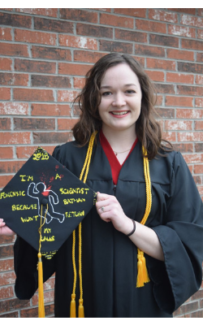Rebecca Tyndall, a 2018 graduate, believes her time at Newman put her a step ahead in her career as a forensic scientist and prepared her to transform society.
Tyndall double majored in forensic science and biology and minored in psychology. She now works in the toxicology department of Quest Diagnostics where she performs testing on urine, blood and oral fluid specimen for the presence of different narcotics. Generally, the testing is done for pre-employment but sometimes they do the testing for clinical specimens or as contract work for crime laboratories.
Tyndall explained her typical day in the laboratory.
“When I arrive, I am assigned a row, or rows, of gas chromatography-mass spectrometry (GCMS) and/or liquid chromatography-mass spectrometry (LCMS) instruments. Each instrument has been validated to run tests for certain narcotics.

“My job is to run the batches of samples through each instrument and review the data to make sure each test passes Quest’s stringent qualifications, such as making sure the chromatography, resolution, ratios and quantification of each analyte is within standards set by the scientific body that accredits each laboratory.”
After reviewing the data again, she creates a paperwork packet to be released to the client. Tyndall also routinely performs maintenance on the instruments and tunes them when problems arise.
She’s thankful for the experience she had working with a multitude of laboratory instruments at Newman.
She said, “In my analytical chemistry classes, I was taught GCMS and LCMS theory and was able to run samples on GCMS instruments, among others. So when I started at Quest and already had GCMS experience, I was ahead of the game.”
Each and every professor she encountered at Newman impacted her current career path, she said. Ryan Huschka, associate professor of chemistry, set up tours of laboratories where Tyndall got to see LCMS instruments in action and ask questions about their use. He also gave assignments that encouraged students to research instruments that interested them, which Tyndall says “helped me take my education and career goals into my own hands.”
She speaks highly of the science professors she had who taught her about the instruments she would work with, introduced her to new career options, fostered her passion for science and overall prepared her for an impactful career.
She pointed out that even her history professors demonstrated how science, history and art are all intertwined.
Tyndall said many of her professors were “instrumental in forging me as a member of this generation who looks forward to leaving her mark on this world and changing it for the better.”

